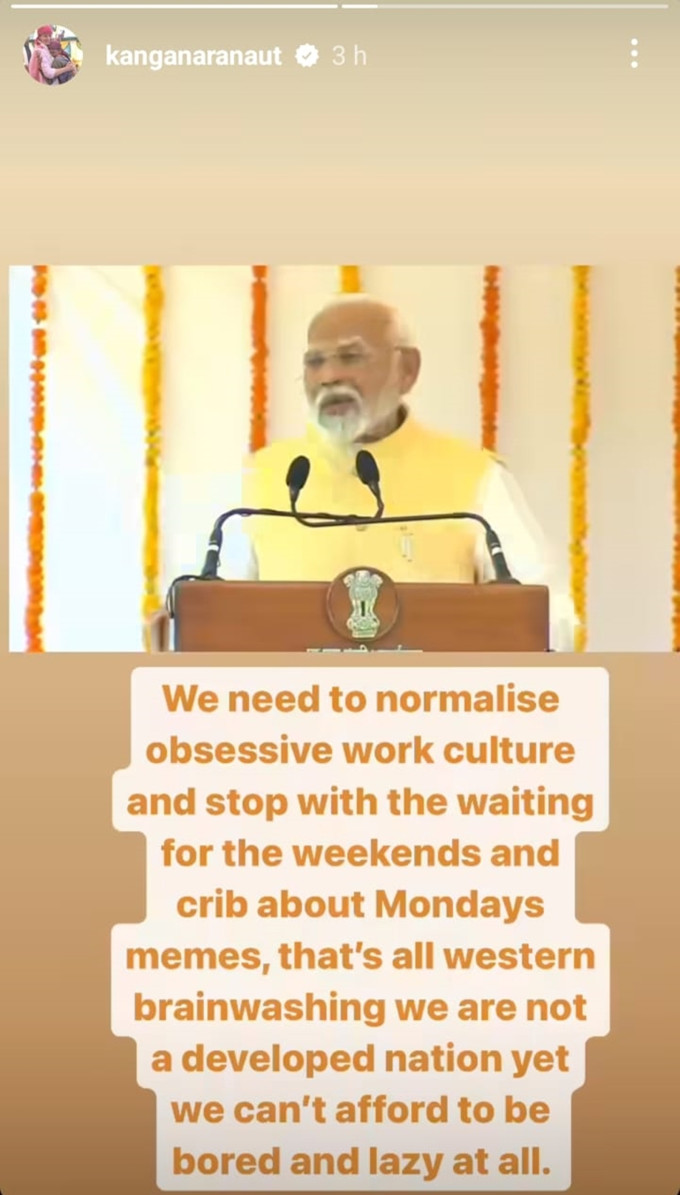New MP Kangana Ranaut endorses workoholism; but do long hours really guarantee productivity?
Days after being embroiled in the slap controversy, Kangana Ranaut has called for the normalisation of workaholism to foster the country’s development.
Kangana expressed her views on Instagram, sharing a clip from Prime Minister Narendra Modi’s inaugural address to PMO staffers, where he laid out his vision for 2047. Modi stated, “Together we have just one goal – Nation First. Just one intention – 2047 Viksit Bharat. I have said this publicly, my each and every moment is for the country. I have also promised the country – 24/7 for 2047.”

Reflecting the Prime Minister’s sentiment, Kangana, who is now the MP from Mandi, stated, “We need to normalise an obsessive work culture and abandon the ‘waiting for the weekends’ and ‘complaining about Mondays’ memes. That’s all Western brainwashing. We are not yet a developed nation, and we can’t afford to be bored and lazy at all.”
But what do experts feel?
Dr Mazher Ali, Consultant Psychiatrist at CARE Hospitals Banjara Hills, Hyderabad, warns that clocking in extra hours doesn’t necessarily translate to increased productivity. It can have the opposite effect.
 Kangana shared this view on her Instagram stories while posting a clip from Prime Minister Narendra Modi’s first address to PMO staffers.
Kangana shared this view on her Instagram stories while posting a clip from Prime Minister Narendra Modi’s first address to PMO staffers.
Not to mention how a culture that glorifies workaholism can have a significant negative impact on a country’s development. Dr Ali said constant pressure to overwork can lead to a widespread mental health crisis, straining healthcare systems and reducing overall well-being. Poor mental health translates to lower productivity, higher absenteeism, and increased healthcare costs, hindering economic growth.
A Stanford University study also throws cold water on the idea of long hours equaling high productivity. Conducted in 2019, the research found that productivity per hour actually starts to plummet after someone works more than 50 hours a week. That’s right, someone who clocks in 70 hours might get the same amount done as someone who works just 55, according to the study.
The law of diminishing returns
There’s a concept in economics called diminishing returns. It applies to work as well. After a certain point, the effectiveness of each additional hour worked starts to decline. You become fatigued, your concentration wanes, and your creativity dries up, said Dr Ali.
Long hours are a recipe for burnout. Physical and mental exhaustion set in, leading to decreased focus, poorer decision-making, and a decline in overall performance. Dr Ali noted this burnout not only affects your current work but can also have long-term consequences.
Quality over quantity
Just because you’re putting in the extra hours doesn’t mean you’re producing high-quality work. The key to success lies in working efficiently and effectively, not just racking up the hours. Focus on achieving clear goals and avoid getting bogged down in busywork.
Maintaining a healthy work-life balance is crucial. Time for rest and relaxation allows you to recharge and return to your work feeling refreshed and focused. This ultimately leads to better quality work in less time.
The long-term toll of overwork
The consequences of working long hours extend far beyond decreased productivity. Chronic health problems like heart disease and diabetes can arise from sustained periods of overwork, explained Dr Ali. Mental health also suffers, with increased risk of depression and anxiety.
A sustainable workforce is the backbone of a thriving nation. Overworked employees lead to high turnover and a disengaged workforce, ultimately impacting a country’s competitiveness.
Disclaimer: The copyright of this article belongs to the original author. Reposting this article is solely for the purpose of information dissemination and does not constitute any investment advice. If there is any infringement, please contact us immediately. We will make corrections or deletions as necessary. Thank you.
